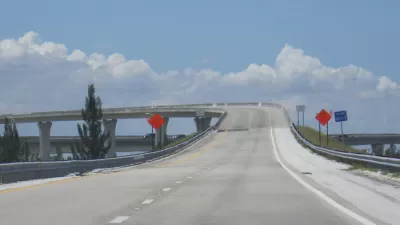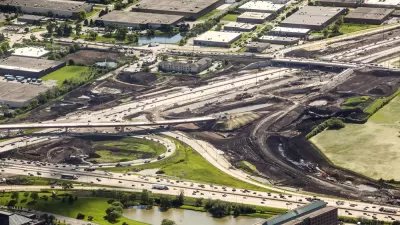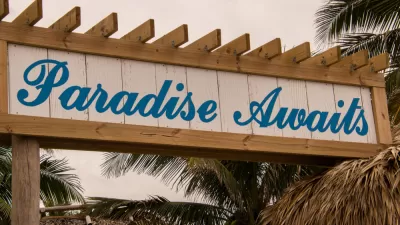Critics worry the proposed 330-mile corridor would encourage sprawl, harm wildlife, and saddle the state with decades of debt.

A proposed highway project in Florida, the Multi-use Corridors of Regional Economic Significance program, or M-CORES, has met with strong resistance from "a diverse cross section of opponents" who have called the proposed highways "roads to ruin."
Despite hopes that the three proposed highways "will help the state keep up with its explosive population growth," Eric Tegenhoff writes in a piece for Grist that groups from conservationists to taxpayer watchdogs have expressed concern about the project's cost and potential disruptions to wildlife habitats and rural economies.
The 330-mile toll road corridor could cost as much as $26 billion and, if completed, is projected to open by 2030. "In a year when lawmakers must reckon with the pandemic’s budget impact, the price tag for M-CORES is difficult for some critics to swallow." Meanwhile, environmental groups argue that new roads will just bring more traffic, encourage sprawl, and "disturb some of the state’s natural barriers against sea level rise, such as wetlands."
According to the Florida Department of Transportation (FDOT), the agency "will conduct financial and environmental feasibility studies when the agency chooses the most suitable path." In a statement sent to Grist, agency spokesperson Natalie McElwee wrote "A 'no-build' option remains on the table." An analysis by an opposition coalition calling itself No Roads to Ruin found that 93 percent of public comments sent to FDOT about the project were negative, "suggesting that there is little constituency for M-CORES."
FULL STORY: Basically everyone in Florida is united against these new highways

Alabama: Trump Terminates Settlements for Black Communities Harmed By Raw Sewage
Trump deemed the landmark civil rights agreement “illegal DEI and environmental justice policy.”

Study: Maui’s Plan to Convert Vacation Rentals to Long-Term Housing Could Cause Nearly $1 Billion Economic Loss
The plan would reduce visitor accommodation by 25% resulting in 1,900 jobs lost.

Planetizen Federal Action Tracker
A weekly monitor of how Trump’s orders and actions are impacting planners and planning in America.

Wind Energy on the Rise Despite Federal Policy Reversal
The Trump administration is revoking federal support for renewable energy, but demand for new projects continues unabated.

Passengers Flock to Caltrain After Electrification
The new electric trains are running faster and more reliably, leading to strong ridership growth on the Bay Area rail system.

Texas Churches Rally Behind ‘Yes in God’s Back Yard’ Legislation
Religious leaders want the state to reduce zoning regulations to streamline leasing church-owned land to housing developers.
Urban Design for Planners 1: Software Tools
This six-course series explores essential urban design concepts using open source software and equips planners with the tools they need to participate fully in the urban design process.
Planning for Universal Design
Learn the tools for implementing Universal Design in planning regulations.
Caltrans
Smith Gee Studio
Institute for Housing and Urban Development Studies (IHS)
City of Grandview
Harvard GSD Executive Education
Toledo-Lucas County Plan Commissions
Salt Lake City
NYU Wagner Graduate School of Public Service





























